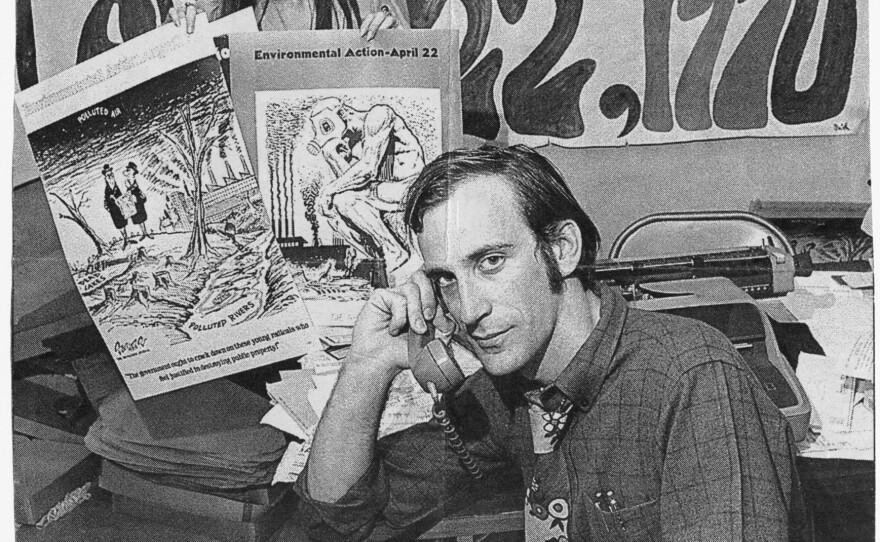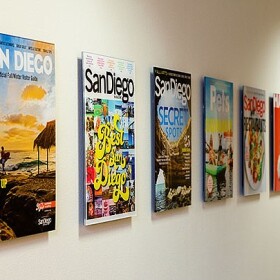Thanks to the pandemic, there won’t be big rallies or festivals to mark the 50th anniversary of Earth Day in San Diego or anywhere else. But the day will not go unremembered.
By the end of the 1960s, the country’s burgeoning environmental movement had been emboldened by the successes of the civil rights and anti-war movements. And in 1970, a group of environmentalists decided the time was ripe to make a strong political statement.
Denis Hayes was one of the original organizers.
We thought that the way to launch it was as they had done with the early stages of the anti-war movement with campus teach-ins," Hayes said. "It turned out that when we got out to campuses, the teach-ins thing was just a little bit passé. So we did an abrupt switch -- changed it from an environmental teach-in into Earth Day."

Hayes said as events were planned in cities across the country, environmental groups in each place had their own issues.
"From inner-city groups that were trying to stop freeways from plowing through their vibrant neighborhoods to people in Santa Barbara protesting the oil spill the previous year," he said. "Just everything from peeling lead paint off of walls to air pollution, where walking down the streets of Los Angeles was like smoking two packs of cigarettes a day.
The purpose of Earth Day. Hayes said, "was to take all of these myriad strands and weave them together into the fabric of modern environmentalism."
An Eventful Day In San Diego
In San Diego, there were events on the campuses of San Diego State University and UC San Diego. But not everyone welcomed them.
At UCSD, someone called the scheduled speaker and told him not to come, according to a newspaper story from that day. Then there was a bomb threat that paused festivities, the story said.
"Reaction among students was of general distaste and impatience," the story reads. One student said it was "a pathetic infantile gesture."
At SDSU, the speaker was Democratic Congressman John Tunney, who went on to become a U.S. senator. He said that very soon engineers would build a smog-free car engine, and issued a warning about the dangers of storing nuclear waste—which resonates today.
"The wells will contain only a 50-year accumulation," Tunney said. "What happens after 50 years?"
Carolyn Chase was at that first Earth Day celebration.
"I was 12 and so we had a poster contest," she said. "I don't think I won, but I definitely remember, I have a visual recollection of carrying a poster through the school.”
Regardless of how she did in the poster contest, the day clearly had an impact on Chase — she's now the organizer of San Diego's EarthFair, which, except for this year, is held annually in Balboa Park.
"What I was looking for in 1970, I was a kid at school, but in 1990, I was looking for how to volunteer for a local conservation group," she said. "That's the purpose of Earth Day, is to get people started because it's like one-stop shopping."
That first Earth Day also launched the recycling movement, said Rick Anthony, another local resident who was at San Diego’s first celebration.
"It was an awakening for sure," he said. "Earth Day was the beginning of a trend."
Using Earth Day's momentum, Anthony organized recycling programs at many local colleges and universities.

Early Success, Recent Inaction
Hayes, the original organizer, said when he looks at where the country was before 1970 and the goals of that first Earth Day, there was remarkable progress in the first 10 years.
"In the aftermath of the first Earth Day we passed the Clean Air Act and the Clean Water Act, Endangered Species Act, Toxic Substances Control Act, Superfund, Marine Mammal Protection Act, National Forest Policy Act, Resource Conservation and Recovery Act, “ Hayes said. "I can go on … for a period we were almost unstoppable."
Then, he said, the country spent the next 40 years spinning its wheels, writing reports on the effects of greenhouse gases and climate change but doing very little. And now, the coronavirus has dramatically changed everything, including this year's Earth Day plans.
"The goal was to put together a billion people on the streets of the planet demanding that this year be the inflection point, that next year we start reducing the amount of greenhouse gas we produced until it gets down to zero," he said. "There would be “750,000 people on the National Mall in Washington, D.C., it's now illegal to have more than 10. So all of the stuff that we were aspiring to do is now illegal."
Instead, they'll have streaming events and focus on the November presidential election. Hayes said the coronavirus is an imperfect analogy to climate change, but there are lessons to be learned.
"I'm hoping that it turns out to be true that humans, like literally all other animals, have not just an individual desire to survive, but a willingness to sacrifice for the species," he said. "And out of that instinctive desire to preserve ourselves, we will come up with enough intelligence to address the major threats of our era."








